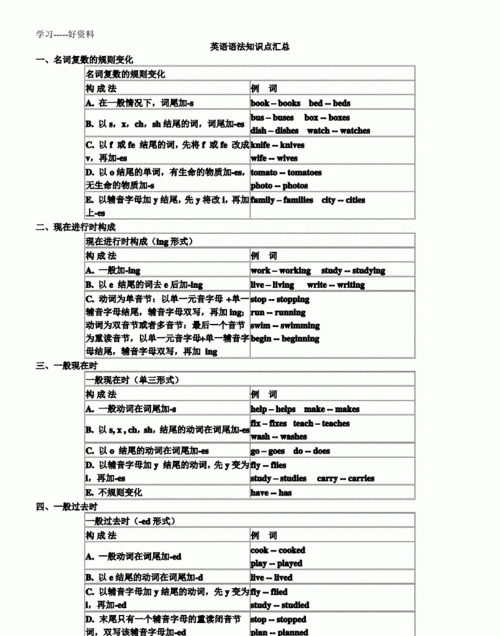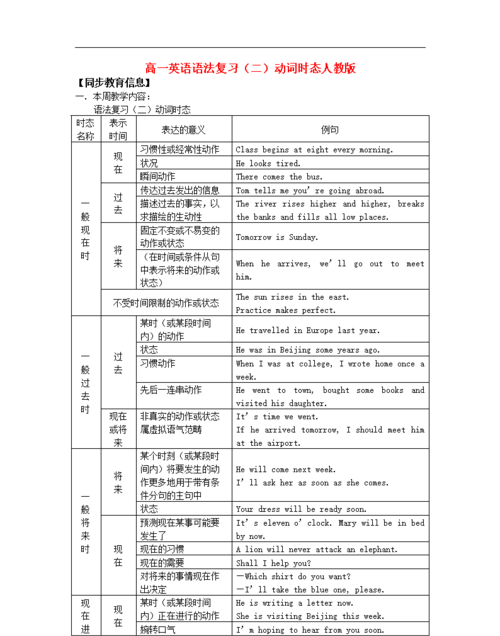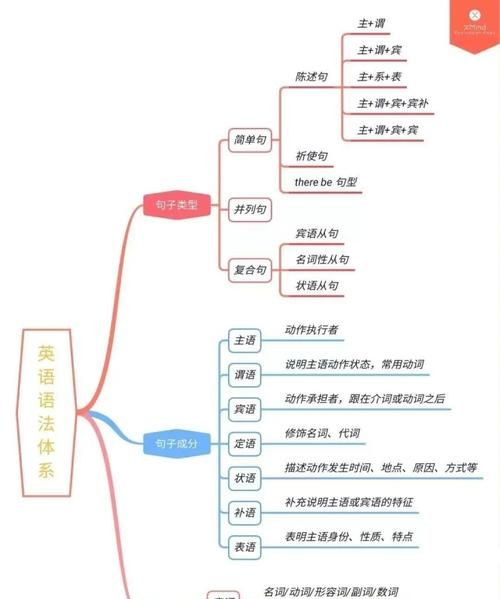本文目录
大学英语六级基础语法知识:虚拟语气有哪些
大学英语六级基础语法知识1. 表示现在/过去/将来情况的虚拟条件句
虚拟条件句主要有三种结构:
1) 表示与现在情况相反:主句谓语用“would / could / might +动词原形”,从句谓语用“动词的一般过去时”(动词be的过去式一律用were)。
If I were you, I would not accept his offer.
If I had time, I would certainly go to the cinema with you.
2) 表示与过去情况相反:主句谓语用“would / could / might + have +过去分词”,从句谓语用过去完成时。
If I had got up a little earlier, I wouldn’t have missed the train.
If I had been more careful, I might have passed that exam.
3) 表示与将来情况相反:主句谓语用“would / could / might +动词原形”,从句谓语用“were +动词不定式”或“should +动词原形”。
If I were to do the job, I would not be able to have enough time to study.
If it should rain tomorrow, I would not go out with you.
大学英语六级基础语法知识2. 虚拟条件句连接词if的省略
如果虚拟条件句的从句中含有were, had, should, could等词时,可以省略连接词if,但这时必须把were, had, should, could等词移到主语前面,形成倒装。这种句型主要用于书面形式。
Were I to do the job, I would finish doing it within two weeks.
Had it not been for his help, we couldn’t have arrived there on time.
Should it rain tomorrow, I would stay at home.
3. wish后宾语从句中的谓语构成
动词wish后的宾语从句表示未实现的或不可能实现的愿望,其宾语从句中的谓语动词要用虚拟语气,有以下三种构成形式。
1) 表示现在不可能实现的愿望,宾语从句中的谓语动词用一般过去时。(be的过去式为were)。
I wish I had enough money to buy a car.
I wish I were as young and energetic as you.
2) 表示过去未能实现的愿望,宾语从句中的谓语动词用过去完成时(had +过去分词)或“would / could + have +过去分词 ”。
I wish I hadn’t made such a mistake.
I wish I could have done it better.
3) 表示将来不可能实现的愿望,宾语从句中的谓语动词用“would / should (could, might) +动词原形”。
I wish I would not get old.
I wish I could travel around the world one day.
大学英语六级基础语法知识4. 某些动词后的宾语从句中谓语动词要用虚拟语气
在一些动词后面的宾语从句中,谓语动词要用虚拟语气。这时,谓语动词用动词原形或should +动词原形。这类动词一般表示命令,要求,决定,建议,主张等概念,主要有:advise, ask, command, decide, demand, desire, direct, insist, move, order, propose, recommend, request, require, suggest,等。
The workers demanded that their wages (should) be raised by 10 per cent.
The teacher decided that you do the experiment first.
5. 某些名词后的表语从句和同位语从句中谓语动词要用虚拟语气
在一些名词后面的表语从句和同位语从句中,谓语动词要用虚拟语气。这时,谓语动词用动词原形或should +动词原形。这类名词一般表示命令,要求,决定,建议,主张等概念,主要有:advice, idea, instruction, motion, order, plan, proposal, recommendation, request, requirement, suggestion,等。
My suggestion is that we (should) send for a doctor immediately.
He gave the order that they (should) do the experiment again.
大学英语六级基础语法知识6. 错综时间条件句
条件从句表示的动作和主句表示的动作,有时发生的时间是不一致的.如从句是对过去情况的假设,而主句可能是对现在正在进行情况的假设。 这种句子称为错综时间条件句.
If the weather had been more favourable, the crops would be growing still better.
更多关于大学英语六级考试的备考技巧,备考干货,新闻资讯等内容,小编会持续更新。

英语四级考语法知识吗
一、英语中构成疑问句(除对主语或主语之定语提问的特殊疑问句外),通常须使用倒装结构,这是英语四级语法结构的需要。
例如:
1.When are we going to drink to your happiness?
我们什么时候喝你们的喜酒?
2.Have you seen the film?
你看了那部电影吗?
3.Have you anything like that?
在美国英语中常见:Do you have anything like that?
你有那样的东西吗?
二、以副词here,there,off,out,away等开头的句子,主要是表示感叹语气的句子,当其主语为名词时,通常要使用倒装。
例如:
4. Here comes our teacher!
我们的老师来了!
5.Away went the boy to the school!
那男孩子到学校里去了!
6.Off goes the woman! 那个女人走了!
三、当构成关联从属连词so...that的so位于句首时,往往要使用倒装结构。
例如:
7.So loudly did the students read that people could hear them out in the street.
同学们大声读书,人们在街上都听得见(他们的读书声)。
8.So small were the words that he could hardly see them.
字那么小,他几乎看不见。
四、以引导词there开头的句子,须使用倒装结构。
例如:
(A) 表示“……有……”之概念的“There+ be +主语” 结构:
9. There are three books on the desk. 桌上有三本书。
10.There were something in the box. 箱子里有东西。
(B) 用于正式文体,特别是文学作品中的 "there+不及物动词十主语" 结构,当主语不明确而又是一个很长的名词短语时,往往使用这种结构:
11.There entered a strange little man.
走进来一个奇怪而身材又矮小的人。
12. Once there lived an old fisherman in a village by the sea.
从前,海边的一个村子里住着一位老渔夫。
在叙述性和描绘性的书面语中,这种结构若带有地点状语,而且把这种状语放在句首时,可以用省略there的倒装结构。如:
13.In the cottage lives a family of six.
在这幢小茅舍里住着一家六口。
五、当平时一般不放在句首的状语,为了强调起见而放在句首时,使用倒装结构。
例如:
14. Near the bridge was an old cottage.
在桥的附近有一幢古老的小茅舍。
15.Well do I remember the day I saw a wild tiger.
见到一只猛虎的那一天,我记得很清楚。
六、当直接引语的一部分或者全部位于句首时,引述分句的主语又是名词或名词短语,该引述分句常用倒装结构。
例如:
16. "What shall we do?" said the teacher."
“我们怎么呢?”老师说。
17、 "Great!" said my father." "I‘ll go there."
"好极了!" 我父亲说。“我将到那里去。”
七、某些让步状语从句往往把表语提到主语前面或放在句首,以构成倒装结构。
例如:
18. No matter how interesting the book is,he doesn‘t like to read it.
语序是:No matter how+表语十主语十系动词be)
不管这本书多有趣,他都不想看。
19.However hard a solid may be,we can change its shape.
(语序是:However+表语+主语+系动词be)不管一个固体有多硬,我们都可以改变其形状。
20.Young as he is, he knows some of the family secrets.
(语序是:表语十as+代词作主语十系动词be)尽管他年纪小,他却知道家里的一些秘密。
21.Difficult as the work was (或:Difficult as was the work),it was finished in time.
(语序是:表语十as十名词作主语十系动词be,或:表语+as+系动词be+名词作主语)工作虽然困难,还是及时完成了。
注:
1) 用as引导的让步状语从句,表语应放在as之前(例20和例21);如果主语是代词,主语就要放在系动词be之前。例20;如果主语是名词,则主语可以放在系动词be之前或后,如例21。
(2) 用as引导的让步状语从句中,如果谓语是“助动词+主要动词原形”,则应把主要动词原形放在as之前,其语序为:主要动词原形+as+主语十助动词。例如:
22. Try as I might, I could not lift the stone.
尽管我用尽力气,我还是举不起这块石头。
八、有些表示“感叹、祝愿”等语气的句子,也可使用倒装结构。
例如:
23.Isn‘t it cold!
天气真冷!
24.Was I surprised!
我真感到惊奇!
25.May "both be happy!"
祝你们两位幸福!
英语四级语法知识:倒装句的内容小编就整理到这里了,更多关于大学英语四级备考技巧,备考干货,新闻资讯,成绩查询,英语四级准考证打印入口,准考证打印时间等内容,小编会持续更新。祝愿各位考生都能取得满意的成绩。

大学英语语法知识点倒装结构
英语四级重点语法知识:倒装句
在有些情况下,句子中的谓语处于主语之前,这种情况被称作主谓倒装。倒装分为全部倒装和部分倒装两种。在全部倒装的句子里,整个谓语都放在主语之前,如:incomeabeautifulgirl。部分倒装句则只是谓语中的一部分放在主语前面,其他的则仍放在主语之后。下面几点讲的是不需要倒装的情况:

l、感叹句中的主谓不需要倒装,仅将what或者how在句子中构成的宾语、表语或者状语部分提到前面。如:Whatacutedog!
2、当引导从句的疑问词和关联词位于从句的开头时,句子中的主谓不需要倒装。如:ThisisthebookwhichIspokeof.
在倒装结构中,当一些具有否定意义的词放在句首时句子为部分倒装,这些词有notuntil,little,hardly,never,rarely,scarcely,only,seldom等,短语有innoway。atnotime,innocase,atnopoint,hardly/rarely/scarcely…,when…nosooner…than…等,如:Littledidshehavethatexperiencebefore,在句子中部分倒装,仅将助动词did提前就可以了。
某些以here,there,now,then等词开头的句子,谓语动词为be,stand,lie,come,go,fall等的一般现在时或一般过去时时,句子为全部倒装,如:Herecomesthebus.再如:
Thebusinessofeachday,_______,wentquitesmoothly.
A.itwassellinggoodsorshippingthem
B.wasitsellinggoodsorshippingthem
C.itbesellinggoodsorshippingthem
D.beitsellinggoodsorshippingthem
整个句子的意思是,日常工作,不管是销售货物还是运输货物,都进行得很顺利。观察句子,即使去掉空格部分,仍然可以构成一个完整的句子。空格部分应该填入从句而不是一个句子,A、B选项为完整的句子,显然不符合语法。C、D两项可以看成是be引导的让步状语从句,这样的从句需要倒装。所以正确答案为D。
除了be引导的让步状语从句需要倒装之外,as引导的让步状语从句必须倒装。though引导的让步状语从句则可以倒装也可以是正常语序。although和eventhough引导的让步状语从句则不能倒装。
以上就是关于英语四级语法知识的分享,希望对想要考四级的小伙伴们有做帮助,想要了解更多相关内容,欢迎及时关注本平台!
五年级英语的语法知识有哪些
宾语从句
在句子中起宾语作用的从句叫做宾语从句.宾语从句分为三类:动词的宾语从句,介词的宾语从句和形容词的宾语从句.
1.宾语从句的连接词
从属连词
连接宾语从句的从属连词主要有that,if,whether.
that引导表示陈述句的宾语从句,而if和whether引导表示“是否”的宾语从句.
He told that he would go to the college the next year
他告诉我他下一年上大学.
I don’t know if there will be a bus any more.
我不知道是否还会有公交车.
Nobody knew whether he could pass the exam.
没人知道他是否会通过考试.
连接代词
连接代词主要有who, whom ,whose ,what ,whoever ,whomever ,whosever, whatever, whichever等.
连接代词一般指疑问,但what, whatever除了指疑问外,也可以指陈述.
Do you know who has won Red Alert game?
你知道谁赢了这一局红警游戏吗?
I don’t know whom you should depend on.
我不知道你该依靠谁.
The book will show you what the best CEOs know.
这本书会告诉你最好的执行总裁该了解些什么.
Have you determined whichever you should buy,a Motorola or Nokia cell phone?
你决定好是买诺基亚还是摩托罗拉的电话了吗?
连接副词
连接副词主要有when,where,why,how,whenever,wherever,however等.
He didn’t tell me when we should meet again.
他没有告诉我什么时候我们能再见面.
Could you please tell me how you read the new panel?
你能展示给我怎么用这个新的操作盘吗?
None of us knows where these new parts can be bought.
没有人知道这些的新的零件能在哪里买到.
2.动词的宾语从句
大多数动词都可以带宾语从句
We all expect that they will win , for members of their team are stronger.
我们都预料他们会赢,因为他们的队员更强壮.
He told us that they would help us though the whole work.
他告诉我们在整个工作中,他都会帮忙的.
部分“动词+副词”结构也可以带宾语从句
I have found out that all the tickets for the concert have been sold out.
我发现这场音乐会的所有票都买光了.
Can you work out how much we will spend during the trip?
你能计算出这次旅行我们将花费多少钱吗?
动词短语也可以带宾语从句
常见的这些词有:
make sure确保 make up one’s mind下决心 keep in mind牢记
Make sure that there are no mistakes in your papers before you turn them in.
在上交试卷前确保没有任何错误.
可运用形式宾语it代替的宾语从句
①动词find,feel,consider,make,believe等后面有宾语补足语的时候,则需要用it做形式宾语而将that宾语从句后置.
I think it necessary that we take plenty of hot water every day .
我认为每天多喝开水是有必要的.
I feel it a pity that I haven’t been to the get-together.
我没去聚会,感觉非常遗憾.
I have made it a rule that I keep diaries.
我每天写日记成了习惯.
We all find it important that we (should) make a quick decision about this mater.
我们都认为对这件事马上做出决定很重要.
②有些动词带宾语从句时寻要在宾语与从句前加it
这类动词主要有:hate, take , owe, have, see to.
I hate it when they with their mouths full of food.
我讨厌他们满嘴食物时说话.
He will have it that our plan is really practical.
他会认为我们的计划确实可行.
I take it that you will agree with us.
我们认为你会同意我们的.
When you start the engine, you must see to it that car is it neutral.
开启发动机时, 一定要使汽车的离合器处于空挡位置.
③若宾语从句是wh-类,则不可用it代替
We all consider what you said to be unbelievable.
我们都认为你所说的是不可信的.
We discovered what we had learned to be valuable.
我们发现我们所学到的东西都是有用的.
3.介词的宾语从句
用wh-类的介词宾语从句
We are talking about whether we amdit students into our club.
我们正在讨论是否让学生加入我们的俱乐部.
The new book is about how Shenzhou 6 manned spaceship was sent up into space.
这本新书是关于神州6号载人航天飞船是如何升如太空的.
用that,if引导的介词宾语从句
有时候except,but,besides三个介词后可见到that引导的宾语从句
I know nothing about my new neighbor except that he used to work with a company.
对于我的新邻居我只知道他曾在一家公司上班,其他一无所知.
4.形容词的宾语从句
常用来引导宾语从句的形容词有: sure,certain,glad,please,happy,sorry,afraid,satisfied,surprised
I am sure I will pass the exam.
我确信我会通过考试.
I am sorry that I have troubled you so long.
很抱歉我这么长时间在打扰你.
He is glad that Li Ming went to see him when he was ill.
他很高兴在他生病的时候李明能去看望他.
5.if,wheter在宾语从句中的区别
①if和whether在作“是否”解时,引导宾语从句常放在动词know,ask,care,wonder,find out等之后,介词后一般不用if
②少数动词,如:leave,put,discuss,doubt后的宾语从句常用whether.
③whether后可以加or not,但是if不可以.
④在不定式前只能用whether.
⑤避免歧异时,我们常用whether而不用if.
6.哪些宾语从句不可以省略引导词that
当that作learn,suggest,explain,agree,wonder,prove,mean,state,feel,hold等动词的宾语时;
当宾语从句较长时;
当主语状语置于主句尾,宾语从句之前时;
当主语谓语动词(包括非谓语动词)与宾语从句之间有插入语时;
当一个动词带有两个或两个以上宾语从句时,此时第一个that可以省略,第二个that不可以省略;
当宾语从句中的主语是this,that或this,that做主语的定语时;
当宾语从句是双宾语中的直接宾语时;
当宾语从句的主语是非谓语动词或主语从句时;
当主语中的谓语动词是固定词组时;
当宾语从句有it做其先行词时;
在直接引语中,转述分句把宾语从句隔开时.
7.宾语从句的否定转移
主句是谓语动词是think,believe,imagine,suppose,consider,espect,fancy,guess等,并且主句的主语是第一人称而且为一般现在时,从句的否定词一般要转移到主句上来,其反义疑问句一般与宾语从句一致.
I don’t think he will come to my party.而不能说成I think he won’t come to my party.
我认为他不会来我的舞会.
I don’t believe that man is killed by Jim,is he?
我认为那个人不是Jim所杀的,是不是?
如果宾语从句中有某个含有否定意义的形容词或副词,其反义疑问句要用肯定形式.
We find that he never listens to the teacher carefully,does he?
我们发现他从来不仔细听老师讲课,是不是?
8.宾语从句的时态和语序
当主句为现在时或将来时的时候,宾语从句的时候一般不受主句的时态所影响.
当主句为过去时的时候
①从句用一般过去时或过去进行时表示与主句谓语动词动作同时发生
I only knew he was studying in a western country,but I didn’t know what country he was in.
我只知道他当时在西方的一个国家读书,可不知道是哪个国家.
He asked me if I was reading the story The Old Man and the Sea when he was in.
他问我他进来的时候我是否在读<老人与海>.
②从句过去完成时表示该动作发生在主句谓语动作之前
He told me that he had told Mary about the meeting already.
他告诉我他已经把有关会议的事情告诉的了Mary.
③从句谓语用过去将来时表示该动作发生在主句谓语动作之后
The reporter asked if the government would take necessary measures to put down the to-do.
记者问政府是否会采取必要的措施镇压骚乱.
如果从句是一个客观真理,那么从句的时候不根据主句的时态而变化
The teacher said that the moon goes around the earth yesterday.
老师昨天说月亮绕着地球转.
当宾语从句的引导词是who,which,what,when,where,how,why等表疑问时,不能按正常语序安排,经常将这类引导词置于句首
Who do you think the public might choose as their favorite singer this year?
你认为今年公众会选谁为他们最喜欢的歌手.

以上就是关于大学英语语法知识大全 ,大学英语六级基础语法知识:虚拟语气有哪些的全部内容,以及大学英语语法知识大全 的相关内容,希望能够帮到您。

